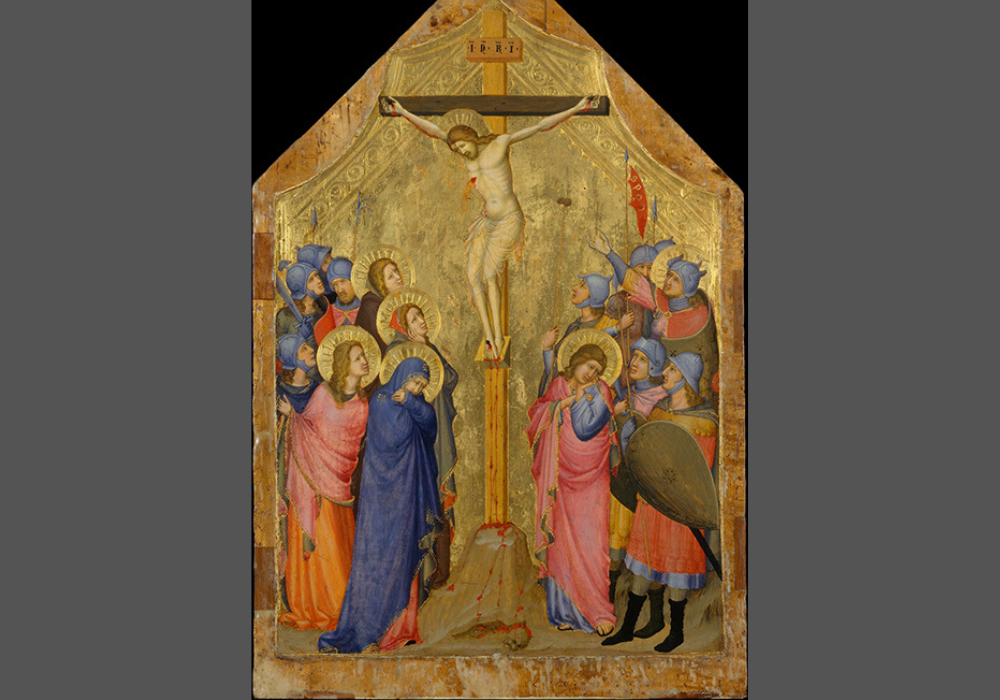
"The Crucifixion," a circa 1330-35 painted panel by Master of the Codex of St. George (Metropolitan Museum of Art)
I am friends with a few Ukrainian Sisters of St. Basil the Great. I am appalled and heartbroken at what has been happening in their country. I think of Gaza where cruelty has brought death and starvation in addition to the destruction of homes, hospitals and schools.
In our own country, human beings exercise the "right" to obtain weapons and wreak senseless violence on the innocent. In too many places, powerful people inflict misery on the vulnerable while the rest of the world stands by wringing our hands. Does that not leave us grieving with Habakkuk who prays, "I cry out to you, 'Violence!' but you do not intervene. Why do you let me see ruin; why must I look at misery?"
The Lord answers that "the vision still has its time … and will not disappoint." What can that mean? Today, this message seems enigmatic or even detached. What are we supposed to believe?
In today's Gospel, the apostles ask for more faith. Speaking with what seems to be untethered exaggeration, Jesus tells them, "If you have faith the size of a mustard seed," you could do the impossible.
Why did Jesus speak of the mustard seed when his friends asked for more faith? Remember, Jesus saw mustard seeds as some of the most prolific things God created (Luke 13:18-19). A minuscule mustard seed grows as its internal dynamism impels it to sprout and burst forth in stupendous growth. It needs soil and water, but its potential is God-instilled, an example of the energy and life the Creator has sown in every living creature.
The mustard seed not only surges forth in growth, it also produces more seeds. In Jesus' vision, faith like the mustard seed is something exuberantly energetic and will not disappoint. That's the kind of power Paul found in the Gospel.
When Paul wrote to his beloved Timothy, he bade him "to stir into flame the gift of God you have through the imposition of my hands." Paul knew that his protégé Timothy had lived his faith with a passion born and nurtured by his family. It was in his blood. Paul was concerned that Timothy could be overwhelmed by the circumstances in which he ministered, losing touch with the fervent faith of his youth and the certainty that God would give him the strength he needed. Like a father, Paul encouraged Timothy to rejuvenate his sense of mission like someone who blows on embers until a flame flares forth and everything catches fire.
Where does this Liturgy of the Word leave or lead us? First, we remember that our faith is not transactional like the relationship between the master and servant in Jesus' parable. Faith has nothing to do with service performed out of duty or to secure a promised reward. Faith involves the vision Christ leads us to share with God. Faith is absolutely and totally relational. As servants of God and members of the body of Christ, we are instilled with the grace and faith-energy of the mustard seed. In Christ's vision, everything we do can lead us and our world into deeper union with God and with all of creation.
So, what about all that seems to be going disastrously in our world today? Here we go back to Habakkuk. Habakkuk's lament came from faith — a deep faith that knew that things shouldn't and didn't need to be as they were. That kind of faith is a call to action. We pray with Habakkuk, not to change God's will, but to open ourselves to the energy and grace of our baptism, to allow mustard seed faith to flower in and among us.
Advertisement
How does that help me as I pray for and talk to my Ukrainian sisters? They are far away, and I am comfortably safe. Because of them and the innocent victims of shootings, because of endless wars and the hatred perpetrated by self-righteous, angry people, I shout with Habakkuk, "Why do you let me see ruin; why must I look at misery?"
It seems that the only answer comes from the women who stood at the foot of the cross. They refused to simply wring their hands. Their weeping and watching was a mustard seed of faith-full-ness. Their presence said, "It does not have to be this way! This is not God's will!" When they could do nothing but watch and weep and love, their presence changed everything. Jesus was not abandoned.
Unleashing mustard seed faith in our circumstances is painful and sometimes dangerous. Today's liturgy asks us if we are ready to pray, "Lord, increase our faith!" If we ask genuinely, it will be granted. The vision God offers still has its time.
